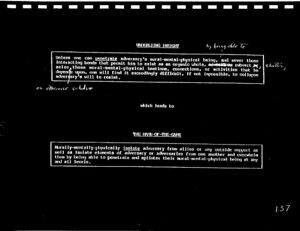Patterns of Conflict
| The works of |
| Works of John Boyd |
|---|
OODA WIKI Edition
Quantico Transcription
Read that first box. An underlying insight. Note what I’m saying there. And I underlined the key word, penetrate. Unless one can penetrate adversary’s moral-mental-physical being, and sever those bonds, or connections, that permit him to exist as an organic hold, as well as subvert or seize those things that he depends upon, you will find it exceedingly difficult, if not impossible, to collapse adversary’s will. If you can’t penetrate and do that, why should he throw the towel in? He won’t.
And so, even though Russians made a physical penetration of Afghanistan, they didn’t penetrate the other stuff, therefore, they didn’t throw the towel in, instead, they had to get out. Just like we did in Vietnam. You think back over everything we’ve talked about the last two nights and tonight, work your way back from Sun Tzu, Mongols, Napoleon, Clausewitz, Jomini, World War I, World War II, blitzkrieg, counter-blitz, guerrilla, counter-guerrilla, that’s what’s going on. Which leads to what I call “the name of the game.” With that penetration, then it permits you to isolate him from his allies, or isolate themselves from one another. In other words, you’re generating those many non-cooperating centers of gravity, they don’t have a base of support that nurtures, that keeps the operation going. It just withers away. It withers away.
Now, if you’re going to have principles of war, which I’ll get into, these are two good principles. Penetrate and isolate. Two of them, at least. You want to penetrate that guy, they’re outwardly focused—you want to isolate those components one from the other, and then subdue or overload those components so you can get him to do what you want him to do, not what he wants to do.
That’s part of it, and I’ll come back to it later on.
